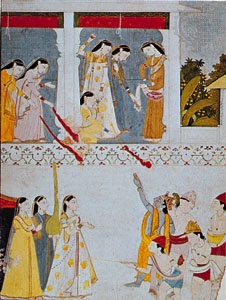Holi
Hindu festival
 Hindu (Hinduism) spring festival celebrated throughout North India on the full-moon day of Phalguna (February–March). The festival has many characteristics of a saturnalia, as does carnival in certain Christian countries. Participants throw coloured water and powders on one another, and, on this one day only, license is given for the usual rankings of caste, gender, status, and age to be reversed. In the streets the celebrations are often marked by ribald language and behaviour, but at its conclusion, when everyone bathes, dons clean white clothes, and visits friends, teachers, and relatives, the ordered patterns of society are reasserted and renewed.
Hindu (Hinduism) spring festival celebrated throughout North India on the full-moon day of Phalguna (February–March). The festival has many characteristics of a saturnalia, as does carnival in certain Christian countries. Participants throw coloured water and powders on one another, and, on this one day only, license is given for the usual rankings of caste, gender, status, and age to be reversed. In the streets the celebrations are often marked by ribald language and behaviour, but at its conclusion, when everyone bathes, dons clean white clothes, and visits friends, teachers, and relatives, the ordered patterns of society are reasserted and renewed.The festival is particularly enjoyed by worshippers of the god Krishna. Its general frivolity is considered to be in imitation of Krishna's play with the gopis (wives and daughters of cowherds). In Vraja (Braja in modern Uttar Pradesh), rituals of reversal culminate in a battle in which the women of the natal village of Radha (Rādhā), Krishna's mistress, pummel the men of Krishna's village with staves; the men defend themselves with shields. A major expression of Holi's mood of relaxation is the Dolayatra (“swing festival”), in which images of the gods are placed on decorated platforms and are swung to the accompaniment of cycles of songs sung only in the spring season. But the most memorable rite in many locales is the kindling of an early-morning bonfire, which represents the burning of the demoness Holika (or Holi), sister of Hiranyakashipu, who enlisted her in his attempt to kill his son Prahlada. It was Prahlada's unshakable devotion to Vishnu that had alienated him from his family. The burning of Holika prompts worshippers to remember how Vishnu (in the form of a lion-man) attacked and killed Hiranyakashipu, showing that faith prevails.
- permutations and combinations
- Pernambuco
- Pernell Whitaker
- pernicious anemia
- Pernik
- Per Olof Sundman
- Per-Olov Enquist
- peromelia
- Peronist
- perosis
- Perot, Ross
- perovskite
- peroxide
- peroxisome
- peroxy acid
- Perpetua
- perpetual calendar
- Perpetual calendar
- perpetual motion
- Perpignan
- Per Ramessu
- Perrault, Charles
- Perrault, Claude
- Perrault, Pierre
- Perrers, Alice